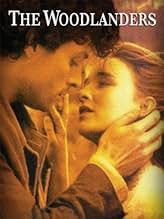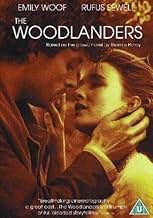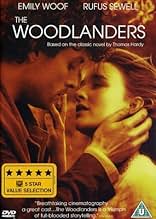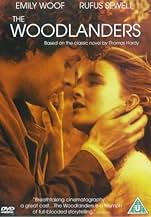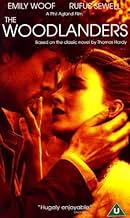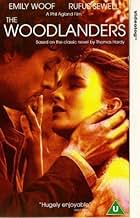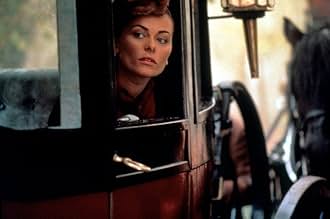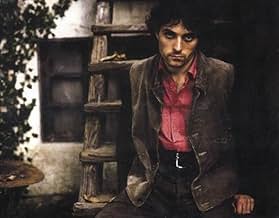Ajouter une intrigue dans votre langueThe story is set in late 19th century rural corner of South England. The daughter of timber merchant Melbury, Grace, returns to the town after finishing school. Her father now believes she c... Tout lireThe story is set in late 19th century rural corner of South England. The daughter of timber merchant Melbury, Grace, returns to the town after finishing school. Her father now believes she can find a better husband than her childhood sweetheart, woodsman Giles. She marries handso... Tout lireThe story is set in late 19th century rural corner of South England. The daughter of timber merchant Melbury, Grace, returns to the town after finishing school. Her father now believes she can find a better husband than her childhood sweetheart, woodsman Giles. She marries handsome young doctor FitzPiers, but soon finds out he's not the man of her dreams and she still... Tout lire
- Réalisation
- Scénario
- Casting principal
- Récompenses
- 3 victoires et 1 nomination au total
Avis à la une
Performance-wise the cast is well-chosen, with gorgeous Rufus Sewell in the lead role as the brooding woodman Giles, who keeps his feelings for the now-better-than-he Grace (Emily Woof) to himself; as Fitzpiers, Cal Macaninch makes the character just as unsympathetic as he was in print (a close cousin to the Brontes' Edgar Linton is this starchy doctor). Jodhi May completes the mix as Marty, the village girl who remains doggedly devoted to Giles.
The countryside is photographed well but the momentum lacks the cinematic scope which would have made this a truly interesting film.
Hardy's characters are quite human, they are always looking for happiness in the wrong places, making bad choices, missing the best opportunities. Here is not different. Marty loves Giles who loves Grace who loves him no more. She is unsure about her feelings since she returned from a period of studies in the town. The small village where she grew up doesn't look much attractive now, neither Giles does. She dreams about going abroad with Mrs. Charmond, the rich landowner widow, while she flirts with the newcomer young doctor - he also came from the town. Soon all of them will be facing the unavoidable fate.
The woodworker Giles (Rufus Sewell) reminds me the shepherd Gabriel from "Far from the Madding Crowd": both are honest, hard-working, heartbroken men. Emily Woof is just perfect as Grace; she looks like Cate Blanchett and she can even play like her. Unfortunately Jodhi May has just a small role as Marty the poor girl who sells her beautiful long hair to survive, a very sympathetic character. Tony Haygarth is also excellent as Grace's father, a well-intentioned man who wishes only the best for his daughter, but practically manipulates her life. I usually see Haygarth playing weird roles, like Renfield in "Dracula" (1979) or the Mad Hatter from Alice's Wonderland in "Dreamchild", so it is refreshing to see him playing normal types. Good film, good story, but not recommended for people looking for something light.
Rufus Sewell, in an early role, brings warmth and life to the film as humble woodsman Giles. He's in love with Emily Woof, who ends up betrothed to another man entirely (local doctor Cal Macaninch). Fleshing out the cast are Tony Haygarth (extremely typecast as a gruff but lovable type, but so good at it) and ROME's Polly Walker, vamping it up as the sinister Mrs Charmond.
This adaptation is well shot and, dare I say it, authentic. The main problem is that the cold characters are so hard to like, and that even includes heroine Emily Woof, who doesn't seem to see what's right under her nose. The only appealing character of the bunch is Sewell and he gets only a little screen time. Yes, this production is moving in places and the themes are engaging, so it's not all bad, but I would have preferred something with a little more drama and oomph.
It has an immense integrity - the recreations of the woodlander's homes and workplaces, as mentioned earlier the superb faultless control of the quality of light (longish scenes shot just after dawn, at dusk etc etc), the authentic period behaviour and manners, the unforced pace mirroring the mood. It is full of traditional understated virtues both the story itself and in the way it wears its technical virtuosity.
If Titanic (mentioned by an earlier reviewer) was a great clanking iron CGI mechanical monster, heavy handed in all departments, this is all living and breathing humanity on a human scale - an increasingly rare treat.
I cannot agree with comments made concerning the scenes dragging or the film itself lacking cinematic scope. Some critics have taken this view but I believe this is rather an indication of how susceptible critics can be to saying what they think people will expect them to say (whilst conveying the distinct impression that they are the most bravely objective critics in the world).
No, this is a film which refuses to go at the pace expected of it but, rather, courageously moves at the precise pace demanded of it by the overall direction and approach. I am glad I haven't read the book because it might have tempted me to try to make a like-for-like comparison and thereby go on to make erroneous deductions.
The two mediums, film and literature, demand different approaches and, to me anyway, this thoughtfully filmed tale is at ease with itself and that is all we can ask of it. It is not trying to be Gone With The Wind or even Pride and Pejudice, nor should it make the attempt.
Like Bleak House, it will completely glide past the attention span of the viewer who is anxious for untimely progression or who is not mentally prepared for its purposely ponderous and understated theme. What I would suggest, most humbly, is that anyone with doubts set aside a whole evening with nothing else planned and no interruptions possible. Then forget anything you have previously experienced concerning this tale and view it afresh. Put away any cynical prejudgement and consciously assume that the film's understated acting is fully intended as such. Then I believe your experience and enjoyment of this film will improve no end.
The director was no doubt under immense pressure to make this tale more paced and juicy. I, for one, fully commend him for resisting this and producing a magnificently restrained U film, a truly English shared countryside, domestic and subtly romantic experience - at least for anyone allowing it the space to embrace them. VNP.
Le saviez-vous
- AnecdotesFinal film of Sheila Burrell .
- Citations
Marty South: Oh, Giles, if only you could tell your heart to be free.
Giles Winterbourne: You can't tell the heart. The heart hopes. Most of all where it's hopeless.
Meilleurs choix
- How long is The Woodlanders?Alimenté par Alexa
Détails
- Durée1 heure 38 minutes
- Mixage
- Rapport de forme
- 2.35 : 1
Contribuer à cette page


